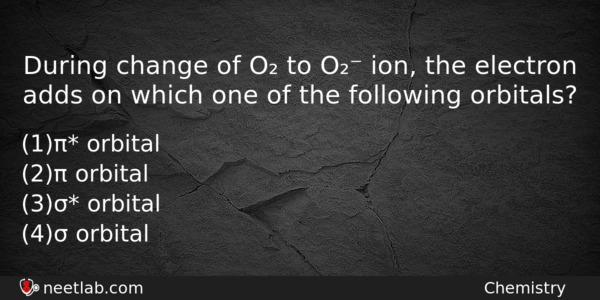| ⇦ | 
| ⇨ |
During change of O₂ to O₂⁻ ion, the electron adds on which one of the following orbitals?
Options
(a) π* orbital
(b) π orbital
(c) σ* orbital
(d) σ orbital
Correct Answer:
π* orbital
Explanation:
O₂ = KK (σ2s)² (σ*2s)² (σ2pₖ)²
(π2pᵢ)² (π2pⱼ)² (π*2pᵢ)¹ (π*2pⱼ)¹
O₂⁻ = KK (σ2s)² (σ*2s)² (σ2pₖ)²
(π2pᵢ)² (π2pⱼ)² (π*2pᵢ)² (π*2pⱼ)¹
Related Questions: - As ester can be prepared by reacting an alkyl halide with
- The number of carbon atoms in Buckminsterfullerene is
- Which of the following is correct relationship
- The base principle of Cottrell’s precipitator is
- The property of crystalline solid is not
Question Type: Memory
(964)
Difficulty Level: Easy
(1008)
Topics: Chemical Bonding and Molecular Structure
(86)
Subject: Chemistry
(2512)
Important MCQs Based on Medical Entrance Examinations To Improve Your NEET Score
- As ester can be prepared by reacting an alkyl halide with
- The number of carbon atoms in Buckminsterfullerene is
- Which of the following is correct relationship
- The base principle of Cottrell’s precipitator is
- The property of crystalline solid is not
Question Type: Memory (964)
Difficulty Level: Easy (1008)
Topics: Chemical Bonding and Molecular Structure (86)
Subject: Chemistry (2512)
Important MCQs Based on Medical Entrance Examinations To Improve Your NEET Score
18000+ students are using NEETLab to improve their score. What about you?
Solve Previous Year MCQs, Mock Tests, Topicwise Practice Tests, Identify Weak Topics, Formula Flash cards and much more is available in NEETLab Android App to improve your NEET score.
Share this page with your friends

Leave a Reply